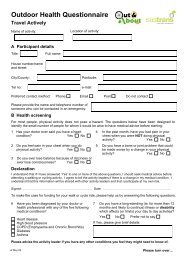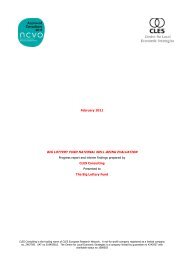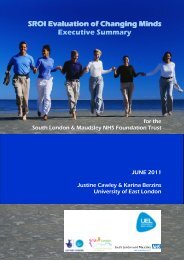Research Methods Handbook.pdf - CLES
Research Methods Handbook.pdf - CLES
Research Methods Handbook.pdf - CLES
You also want an ePaper? Increase the reach of your titles
YUMPU automatically turns print PDFs into web optimized ePapers that Google loves.
What do I need to consider?Practical issuesDiscussion groups usually last one hour or so and include between sixto twelve participants. Participant recruitment is very important andcan be done through a range of methods, including client contact lists,existing networks and databases, advertising in appropriate public placesand via the media, and ‘hanging around’ places asking people to joinin. These varied methods of recruitment mean that discussion groupscan be targeted at different participants, including groups traditionallyconsidered ‘hard to reach’, such as young people and people from Blackand Minority Ethnic (BME) backgrounds. Incentivising participants fortheir time requires some ethical consideration. However, expenses fortravel should always be provided, as well as food and sometimes vouchersor cash payment.Decide on the make up of the groups - identify the key groupsand individuals that you need to speak to depending on whatyou need to find out. Identify the individuals you need tocontact. You may know of people directly or you may require theassistance of others to provide you with a ‘route in’ to findingparticipants (eg project staff, community champions). If this isthe case, simply outline what you intend to do and enquire asto who they think the best people to involve in the focus groupwould be. However, be aware that you should try to attract arange of participants with different views and experiences andthat relying on one person to find all of your participants maylimit this taking place.Arrange a location - ideally the discussion group should be heldin a location that is familiar to the participants, as this familiarityreduces the anxiety of the participant. The next step is tocontact all potential participants to invite them to the group,tell them what it is about, and inform them of the time, locationetc. Ensure that you have more contact names than you needfor the discussion group as some people may not wish to beinvolved.QuestionsThe types of questions that could be asked during a discussion groupcan be similar to interview questions, such as fact-finding, idea generating,exploratory and experiential. The main rationale for choosing toundertake group discussions as opposed to interviews should not bethe type of questions you are asking, rather to whom you are askingthe questions. Within group discussions having things to show or todemonstrate can really help the discussion as people interact with eachother and the stimulus provided.FacilitationFocus group facilitation is a very specific skill, groups are notoriouslysusceptible to dynamics and can be quite difficult to “control”, consequentlyif your requirements or parameters are very tightly definedthen a focus group may be inappropriate. Some people find such situationsintimidating and do not contribute as much as they would in aone-to-one situation whilst some people may affect the dynamics bydominating proceedings.• In preparing for the discussion, it is worthwhile having ashortlist of questions, ideas and thoughts on the topic. The listcould be useful in starting the discussion and ensuring it flowscontinuously.• Ask relevant and open questions so that the discussion hasbreadth. It is important that the group has a discussion ratherthan a question and answer session. Therefore try to steer clearof questions that are narrow and can be answered easily withoutdiscussion.• Encourage group interaction and participation. All members ofthe group should make a contribution to the discussion. Try toavoid just one or two people dominating.• Pursue, capture and develop emerging issues. A good facilitatorshould spot issues that are emerging in the discussion and tryto get the group to discuss them in more detail.• Try to ensure that the discussion remains focused on the keythemes or issues.Recording the discussionThis can be done either through the use of a tape recorder or by takingnotes. Tape recording the discussion is useful in ensuring that noimportant points are missed and enables the facilitator to focus on44 45









